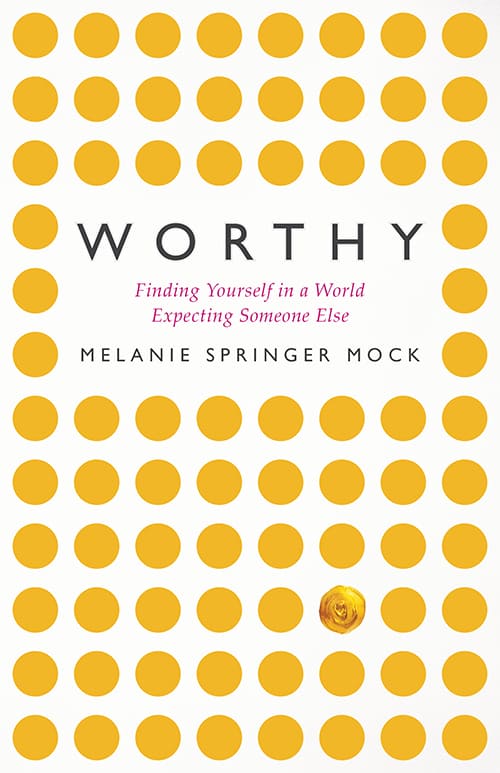
In an interview with Seventeen magazine, Storm Reid, who plays Meg in the recent film adaptation of A Wrinkle in Time, gives some advice to her fans. She says, “Be around people who empower you and lift you up and make you feel better about yourself. We all need to have that constant reminder that we are good enough.”
Storm would probably enjoy reading Melanie Springer Mock’s newest book, Worthy: Finding Yourself in a World Expecting Someone Else.
As a 13-year-old girl, sometimes I feel like the entire world is a black hole, draining away my self-confidence and leaving me with a feeling of lacking. (Then again, anyone who says they have never felt unworthy is a liar.) The church, and indeed the very Bible, tells me that accepting Christ into my heart makes me forgiven, loved, and worthy, and that Jesus is the only thing that can fill that void I feel. However, as special as it is to be part of a church, and to be part of a community rooted in God, the church is a group of humans—and the messages they send about our individual worth can be deeply flawed.
The church is a group of humans—and the messages they send about our individual worth can be deeply flawed.
Outside of church, finding sources of jealousy and guilt are easy. Look up “how to lose weight” on Google, and it will load approximately 116,000,000 results in only half a second. (Yes, I actually Googled it to check the number.) The phrase “how to be prettier” will give you 15,700,000 results, “how to be smarter” pops up 106,000,000 results, and “how to be popular” rounds up a whopping 5,500,000,000 results. Some of these various websites may actually help you look a bit better, or do a bit better in school, or get healthier, but they are also guaranteed to make you feel bad about your current state. That’s the whole point of their existence. They make you feel bad, and try to offer a solution—from a quick fix to whole new lifestyle, and/or everything in between. Be it on a website from a Google search, or on social media, or in a magazine, or on a billboard, people and companies want to make you feel bad, and then tell you that their product, their idea, their power will make you whole. In essence, they are claiming that they can complete you in a way that only God can, and they can fix all your problems that maybe aren’t even problems to begin with.
Melanie Springer Mock presents these ideas beautifully in her book. She recounts stories from her own life and connects them to ideas about value and expectations in a way that resonated with me. I found myself making many connections to her experiences: feeling super-faithful after a Christian retreat only for that feeling to be messed up by my siblings as soon as I got home, feeling like I didn’t have a good enough testimony about how God saved me, feeling like I wasn’t doing enough in the church. I almost felt like I was reading a book written by my future self, if I was a Mennonite—although Mock points out that it isn’t the “Mennonite” or “Baptist” or “Episcopalian” part that’s important; the “Christian” part is what’s important.
Every single Christian is connected to one another by our Savior, Mock writes, and we should recognize the inherent worth of, and be accepting to, all of our sisters and brothers in Christ. Even if we think we’re already good at loving others, we may need to take a second look.
Even if we think we’re already good at loving others, we may need to take a second look.
Reading Worthy, I found out that I still have expectations that are discriminatory, even though I thought I was doing great with the whole “acceptance” thing. For example, I realized that I tend to consistently link motherhood and womanhood as if they were near synonyms. Perhaps it’s because I’m the oldest of five children, perhaps it’s because I really want to be a mother when I grow up, but for some reason, I never pondered the thought that I was discriminating against other women. I wasn’t actively rejecting the idea of single women, or married women without children, but I wasn’t fully accepting of it, either. Reading Worthy made me rethink my own beliefs, and the assumptions I had unthinkingly made about the worth of others.
As it says in Romans 3:23, “for all have sinned and fall short of the glory of God,” and one of the ways we have all sinned is that we have been discriminatory in some way or another. But the very next verse says, “and all are justified freely by his grace through the redemption that came by Christ Jesus.” That’s the whole point of Mock’s book. This book is both a story and a message: a message that all people are created in the image of God.
Straight people, gay people, bisexual people, asexual people, African Americans, Caucasian Americans, Latin Americans, Asian Americans, boys, girls, men, women, transgender, rich people, poor people, big people, small people, “pretty” people, “ugly” people, and many, many more that I don’t include here for the sake of making this readable. All people.
Mock presents this concept in a way that most other books about self-worth don’t touch upon: connecting these values to social justice. I see social problems, especially discrimination, as a significant issue nowadays. Browse a list of recent news stories, and chances are high that you’ll find something about discrimination, be it racism, sexism, debates over gender, etc. But God created all people in His image, and we should both accept and help them. In Luke 12:27-28, we see a glimpse of how God views each one of His children: “Consider how the wild flowers grow. They do not labor or spin. Yet I tell you, not even Solomon in all his splendor was dressed like one of these. If that is how God clothes the grass of the field, which is here today, and tomorrow is thrown into the fire, how much more will he clothe you—you of little faith!”
 Speaking of flowers, imagine a rose bush. Before the roses bloom, it looks like a mess of sticks and thorns. But when it blooms, it puts forth an array of gorgeous flowers. We are like rose bushes. We may have some parts of us that are messed up, we may have some prickly parts, but when we shine Christ’s light unto the world around us, that doesn’t matter. In the song “Priceless” by For King and Country, it says, “I see a rose in bloom / At the sight of you / Oh so priceless.” Like the single yellow rose on the cover of Mock’s book, we are roses in full bloom, watered with Living Water and rooted in the God who will never change. And we are loved, we are worthy, thorns and all.
Speaking of flowers, imagine a rose bush. Before the roses bloom, it looks like a mess of sticks and thorns. But when it blooms, it puts forth an array of gorgeous flowers. We are like rose bushes. We may have some parts of us that are messed up, we may have some prickly parts, but when we shine Christ’s light unto the world around us, that doesn’t matter. In the song “Priceless” by For King and Country, it says, “I see a rose in bloom / At the sight of you / Oh so priceless.” Like the single yellow rose on the cover of Mock’s book, we are roses in full bloom, watered with Living Water and rooted in the God who will never change. And we are loved, we are worthy, thorns and all.
Annika Evans lives in Pennsylvania and is in eighth grade. She enjoys ballet, musical theater, playing the harp, and My Little Pony.

